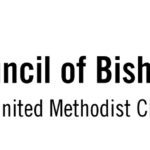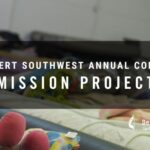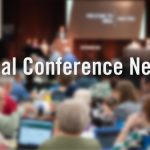 by Kathy Schock, Chair of Christian Unity and Interreligious Relationships
by Kathy Schock, Chair of Christian Unity and Interreligious Relationships
In April, as incoming chair of the Conference CUIR commission, I had the opportunity to attend the National Workshop for Christian Unity and United Methodist Ecumenical and Interreligious Training (UMEIT) in Albuquerque. The theme of the weekend was Has Christ Been Divided? In the first day of meetings, we pondered “What are others doing to connect in ecumenism around the country?” and “Where are we in the process of full communion with the Episcopal Church?”
As we talked about our individual Conferences and what we are doing locally, we discovered ways we can link our social concerns and work towards full communion with Lutherans and Episcopalians. We discussed the need to support our own while being in dialogue ecumenically.
 Dr. Hendrik Pieterse, Associate Professor of Global Christianity and World Religions, Garrett-Evangelical Theological Seminary, presented United Methodism in a World Church: Reimagining Identity and Mission. He shared that the world is furiously religious, that we are connected through scripture, and that cultural diversity should be viewed as a gift.
Dr. Hendrik Pieterse, Associate Professor of Global Christianity and World Religions, Garrett-Evangelical Theological Seminary, presented United Methodism in a World Church: Reimagining Identity and Mission. He shared that the world is furiously religious, that we are connected through scripture, and that cultural diversity should be viewed as a gift.
The National Workshop for Christian Unity opened with a plenary session with Rev. Joseph Komonchak, a Catholic priest from New York who is a specialist in the history and theology of the Second Vatican Council. He covered the history of the relations between Catholics and Protestants before and after Vatican II. Information about the teachings of Father Komonchak is available at his blog www.jakomonchak.wordpress.com/about.
Another session included a storytelling lab led by Sean Buvala. He led us through sharing of narratives. I had the opportunity to spend some one-on-one time with him and got some ideas about telling the stories important to me. Sean Baluva has a number of resources on the art of storytelling available at his website www.seantells.com. The second session was Ecumenism: A New Horizon in Hispanic/Latino Ministry led by Alejandro Aguilera-Titus, Assistant Director of the Secretariat for Cultural Diversity in the Church at the U.S. Conference of Catholic Bishops. He shared that Hispanic culture is ecumenical and that in the Hispanic community, those who trust the church do better economically and educationally.
A plenary luncheon with Rev. Dr. John Armstrong, minister in the Reformed Church in America, explored the relationship between Catholics and Evangelicals. As an adjunct professor of mission at Wheaton College Graduate School in the Billy Graham Center and the author/editor of 13 books; his primary goal is to mentor young leaders, both Catholic and Protestant. See Rev. Dr. John Armstrong’s efforts in unification at www.act3network.com.
 Mornings opened with Bible study presented by Rev. Dr. George “Tink” Tinker who has written several books and teaches Native American cultures, spiritualism, and history at Iliff School of Theology. George Tinker’s interesting book about theology and Indian affairs is available at www.amazon.com/American-Indian-Liberation-Theology-Sovereignty/dp/1570758050. I truly enjoyed Dr. Tinker’s presentations about the Bible, missionaries, and Native American spirituality. Rev. Debbie Royals, a Pascua Yaqui from Tucson and interim director at Cook Native American Ministries shared the inter-tribal experience of indigenous people living in urban centers. She is also an Episcopal minister and serves as the interim director of the Indigenous Theological Training Institute.
Mornings opened with Bible study presented by Rev. Dr. George “Tink” Tinker who has written several books and teaches Native American cultures, spiritualism, and history at Iliff School of Theology. George Tinker’s interesting book about theology and Indian affairs is available at www.amazon.com/American-Indian-Liberation-Theology-Sovereignty/dp/1570758050. I truly enjoyed Dr. Tinker’s presentations about the Bible, missionaries, and Native American spirituality. Rev. Debbie Royals, a Pascua Yaqui from Tucson and interim director at Cook Native American Ministries shared the inter-tribal experience of indigenous people living in urban centers. She is also an Episcopal minister and serves as the interim director of the Indigenous Theological Training Institute.
The United Church of Christ Conference minister from AZ, Rev. Dr. John C. Dorhauer, and Bishop Oscar Cantu of the Diocese of Las Cruces, NM, spoke to us about immigration issues. He told a story of a girl from Guatemala who had taken refuge at a church in Sahuarita, AZ. She was pregnant and when she sought medical help, she was turned in and sent “back” to Mexico. To help, we need to become immigrant welcoming congregations and stay informed and aware of what is happening to the immigrants in our midst.
“People look out their church window and assume that’s how it is everywhere” was the closing message from Dr. Diana Butler Bass, author and consultant. She shared the following national statistics:
- Adults under age 40 who choose to join a church will not choose to join a mega church
- People raised in mainline protestant churches are more likely to go back as adults than we would believe
- 35% of adults list themselves as having no religious affiliation
Dr. Butler Bass stated that in order to connect with them we must be sensitive and open.
 Worship each evening was fully ecumenical. The first was at the Episcopal Church. In the second service of the Eucharist, I had the unbelievable experience of processing with the priests and Bishop and read scripture in Spanish. I was amazed that I was able to do this in the Catholic Church. The last service was in the Methodist Church. Communion, which was served by clergy of several faiths, was interesting with grape juice, wine, intinction, drinking from the cup, and blessing by the priests.
Worship each evening was fully ecumenical. The first was at the Episcopal Church. In the second service of the Eucharist, I had the unbelievable experience of processing with the priests and Bishop and read scripture in Spanish. I was amazed that I was able to do this in the Catholic Church. The last service was in the Methodist Church. Communion, which was served by clergy of several faiths, was interesting with grape juice, wine, intinction, drinking from the cup, and blessing by the priests.
Throughout the Conference I was impressed with the knowledge and commitment of the people involved. There truly is a desire to break down any existing barriers. The body of Christ is not divided!




